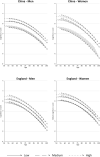Life Course Socioeconomic Position and Cognitive Aging Trajectories: A Cross-National Cohort Study in China and England
- PMID: 37746633
- PMCID: PMC10516463
- DOI: 10.1093/geroni/igad064
Life Course Socioeconomic Position and Cognitive Aging Trajectories: A Cross-National Cohort Study in China and England
Abstract
Background and objectives: Cross-national research on cognitive aging inequality has largely concentrated on Western countries. It is unclear whether socioeconomic position (SEP) has similar effects on cognitive decline in emerging economies. We compared the association between life course SEP and cognitive function trajectories between China and England, the largest nation under state socialism and one of the oldest capitalist countries.
Research design and methods: This cross-cohort study examined participants aged 50 years and older from the China Health and Retirement Longitudinal Study (n = 12,832) and the English Longitudinal Study of aging (n = 8,875). Cognition z-scores were derived using comparable measures of memory and time orientation on 4 occasions. Life course SEP was self-reported by participants at baseline. Seven- to 8-year trajectories of cognition z-scores were estimated using latent growth curve modeling. Country- and gender-specific associations between childhood/adolescent deprivation, education, material wealth, and home ownership were evaluated in relation to model intercept (baseline level) and linear slope (annual rate of change) of cognition.
Results: After multivariable adjustment, education was positively associated with the greatest differences in baseline cognition across country and gender. Education was further linked to a slower rate of cognitive decline (z-score units per year); but compared with those with low education, Chinese men (b = 0.032) and women (b = 0.065) with high education had significantly slower declines than English men (b = -0.004) and women (b = 0.010) with high education.
Discussion and implications: Despite substantial between-cohort differences in downstream and upstream determinants of dementia, education provided the greatest benefits to cognitive aging in England but particularly in China.
Keywords: Cognitive aging; Cognitive decline; Cross-cohort study; Socioeconomic position; Socioeconomic status.
© The Author(s) 2023. Published by Oxford University Press on behalf of The Gerontological Society of America.
Conflict of interest statement
None.
Figures
Similar articles
-
Life course socioeconomic position and incidence of mid-late life depression in China and England: a comparative analysis of CHARLS and ELSA.J Epidemiol Community Health. 2019 Sep;73(9):817-824. doi: 10.1136/jech-2019-212216. Epub 2019 Jun 29. J Epidemiol Community Health. 2019. PMID: 31255999
-
The Effect of Childhood Socioeconomic Position and Social Mobility on Cognitive Function and Change Among Older Adults: A Comparison Between the United States and England.J Gerontol B Psychol Sci Soc Sci. 2021 Jun 8;76(Suppl 1):S51-S63. doi: 10.1093/geronb/gbaa138. J Gerontol B Psychol Sci Soc Sci. 2021. PMID: 34101811 Free PMC article.
-
Cognitive reserve over life course and 7-year trajectories of cognitive decline: results from China health and retirement longitudinal study.BMC Public Health. 2022 Feb 4;22(1):231. doi: 10.1186/s12889-022-12671-6. BMC Public Health. 2022. PMID: 35120480 Free PMC article.
-
Socioeconomic and Contextual Differentials in Memory Decline: A Cross-Country Investigation Between England and China.J Gerontol B Psychol Sci Soc Sci. 2023 Mar 4;78(3):544-555. doi: 10.1093/geronb/gbac163. J Gerontol B Psychol Sci Soc Sci. 2023. PMID: 36625075 Free PMC article.
-
Life course socioeconomic position and mid-late life cognitive function in Eastern Europe.J Gerontol B Psychol Sci Soc Sci. 2014 May;69(3):470-81. doi: 10.1093/geronb/gbu014. Epub 2014 Mar 5. J Gerontol B Psychol Sci Soc Sci. 2014. PMID: 24598045 Free PMC article.
References
-
- Ahmadi-Abhari, S., Guzman-Castillo, M., Bandosz, P., Shipley, M. J., Muniz-Terrera, G., Singh-Manoux, A., Kivimäki, M., Steptoe, A., Capewell, S., O’Flaherty, M., & Brunner, E. J. (2017). Temporal trend in dementia incidence since 2002 and projections for prevalence in England and Wales to 2040: modelling study. British Medical Journal, 358, j2856. doi:10.1136/bmj.j2856 - DOI - PMC - PubMed
-
- Andresen, E. M., Malmgren, J. A., Carter, W. B., & Patrick, D. L. (1994). Screening for depression in well older adults: Evaluation of a short form of the CES-D (Center for Epidemiologic Studies Depression Scale). American Journal of Preventive Medicine, 10(2), 77–84. doi:10.1016/S0749-3797(18)30622-6 - DOI - PubMed
-
- Bloomberg, M., Dugravot, A., Sommerlad, A., Kivimäki, M., Singh-Manoux, A., & Sabia, S. (2023). Comparison of sex differences in cognitive function in older adults between high- and middle-income countries and the role of education: A population-based multicohort study. Age and Ageing, 52(2), afad019. doi:10.1093/ageing/afad019 - DOI - PMC - PubMed
-
- Cadar, D., Abell, J., Matthews, F. E., Brayne, C., David Batty, G., Llewellyn, D. J., & Steptoe, A. (2020). Cohort profile update: The harmonised cognitive assessment protocol sub-study of the English Longitudinal Study of Ageing (ELSA-HCAP). International Journal of Epidemiology, 50(3), 725–726i. doi:10.1093/ije/dyaa227 - DOI - PMC - PubMed
LinkOut - more resources
Full Text Sources



